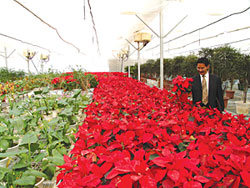 It is crisp and cold on the floodplain of the Lhasa River as Nyima Tashi takes visitors on a tour of his life's work: rows and rows of greenhouses up to 100 metres long. Inside, Nyima's spectacles steam up as he shows us cherry tomatoes, miniature cucumbers and yellow watermelons.
It is crisp and cold on the floodplain of the Lhasa River as Nyima Tashi takes visitors on a tour of his life's work: rows and rows of greenhouses up to 100 metres long. Inside, Nyima's spectacles steam up as he shows us cherry tomatoes, miniature cucumbers and yellow watermelons. It is clear as he caresses the vegetables that this is a labour of love for the Nepal-trained agronomist who has single-handedly made Lhasa self-sufficient in vegetables. The growing season lasts only four months in the cold and arid plateau. The rest of the year, Tibetans have usually relied on dried and pickled vegetables or imported them from Nepal.
On a stint in mountain farming systems with ICIMOD in Kathmandu, Nyima dreamt one day of growing vegetables on the plateau. Within five years, his Tibetan Academy of Agriculture and Animal Husbandry outside Lhasa is a much talked-about success story. It is testimony to one man's vision and also turns the myth that only the private sector can show initiative on its head.
"Tibet is cold but our winters are sunny," expains Nyima, "so we perfected this greenhouse design that is covered with a blanket at night to keep the trapped daytime heat in." Indeed, the temperature inside stays at 18 degrees at night even when it is below zero outside.
Nyima has a strong marketing team that analyses demand and plans cropping cycles to get the best prices. Encouraged by his success with organic vegetables, the farm is now branching out into exotic fruits, tissue culture, Tibetan medicinal plants and high-value ornamental flowers. Nyima shows us potted poinsettias and cacti that are being readied for the holiday season (pictured). The farm now sells 2.5 million yuan worth of vegetables and flowers and ploughs the profit into expansion.
The Academy is sharing this knowledge with other mountain regions of the world and has set up an information exchange data base. Says Nyima: "I was inspired to do this in Nepal, and I'd now like to give back what we have learnt here to farmers in similar climatic regions like Manang, Mustang or Ladakh."
Kunda Dixit


